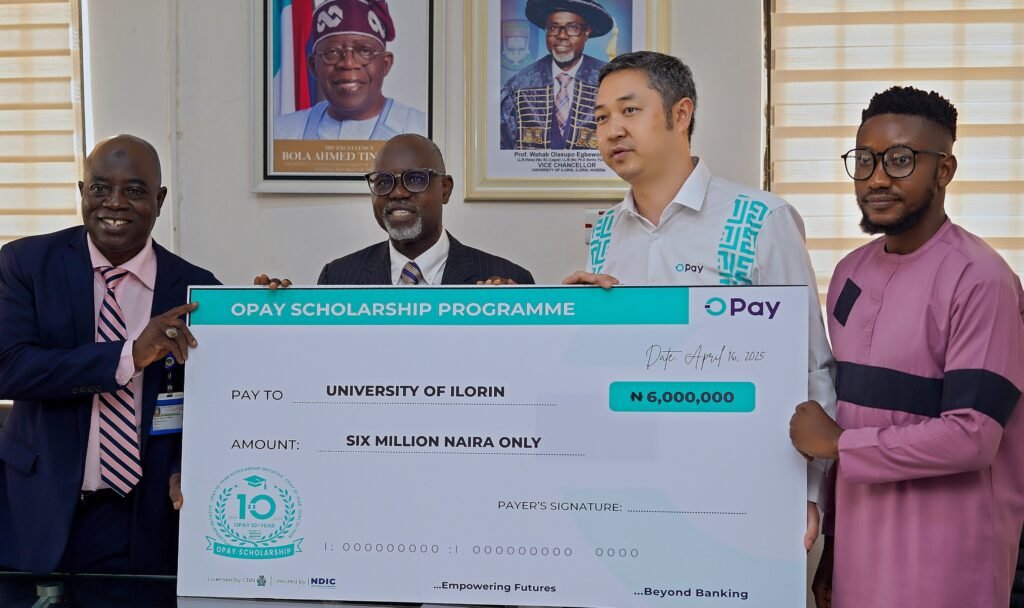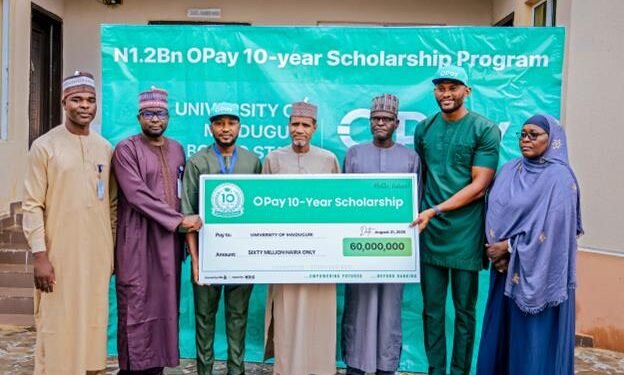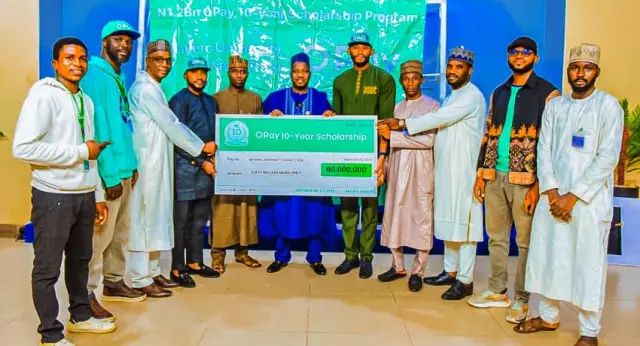In a move that signals serious backing for tertiary education in Nigeria, financial-technology firm OPay has unveiled a bold 10-year scholarship initiative with a total target of ₦1.2 billion. The programme aims to transform educational opportunities across the country by supporting hundreds of students each year. In its first year alone, OPay has already disbursed ₦126 million to 420 students at 20 tertiary institutions nationwide.
At a recent event billed as the “Empowering Futures 2025” conference, held in Lagos, the company reaffirmed its long-term vision and laid out how it plans to roll out the scholarship scheme gradually over the next decade.
Table of Contents

First Year Success: Numbers and Reach
During the first phase of the programme:
- A total of ₦126 million has been paid out to scholarship recipients.
- 420 undergraduate students across 20 tertiary institutions have benefited so far.
- Each student received ₦300,000 in educational assistance.
- The 20 institutions span federal universities, state universities and polytechnics in multiple regions of the country.
For instance, institutions such as Ahmadu Bello University (Kaduna State), University of Ibadan (Oyo State), Obafemi Awolowo University (Osun State) and University of Calabar (Cross-River State) are among those targeted in the scheme’s first phase.
OPay’s Chief Commercial Officer, Elizabeth Wang, emphasised that the first-year milestone reflects both deliverable action and a stepping-stone for broader ambitions. She noted: “In the past one year, we’ve disbursed ₦126 million, supported 420 students, and partnered with 20 universities. We are proud to have delivered on our first year’s commitment, and we will continue to sustain and expand this initiative over the next nine years.”

Strategic Vision & Complementary Initiatives
Beyond the headline scholarship figures, OPay has positioned this scheme as part of a broader social-impact strategy emphasising digital inclusion, youth empowerment and human capital development. By linking financial-technology access with educational opportunity, the company aims to foster a generation of students who not only lack financial hurdles but are also technologically ready for tomorrow’s economy.
Part of the rollout includes an initiative labelled “CyberLabs”, which will see the establishment of digital learning facilities across partner institutions, offering students a chance to learn and collaborate in tech-rich environments. For example, at the launch event, OPay announced plans to upgrade university technology labs and deepen industry-academic tie-ins.
Moreover, the scholarship programme is designed to become an annual fixture: the company plans to invest roughly ₦120 million per year, supporting a minimum of 400 students nationwide through the full decade.
Why This Matters for Nigeria’s Higher Education Landscape
The education sector in Nigeria continues to face multiple challenges, including rising tuition bills, insufficient infrastructure, and a mismatch between academic training and labour market needs. For many gifted students, financial constraints lead to deferred studies or drop-outs. OPay’s scheme, therefore, addresses not just individual student needs but also systemic weaknesses, by infusing resources, linking institutions and promoting digital readiness.
From a broader corporate-citizenship perspective, this move represents a positive step for the fintech sector in Nigeria. As one university vice-chancellor noted, the scholarship is not only a relief for financially constrained students but also a morale-booster for educators and administrators alike.
It is also notable for several reasons:
- It is a long-term commitment (10 years), rather than a one-off gesture.
- It integrates technology (via CyberLabs) with traditional scholarship support.
- It spans multiple institutions and regions, promoting inclusive access across the country.
- It aligns with Nigeria’s broader goals of youth empowerment, domestic innovation and economic diversification.
Challenges & Areas for Future Focus
While the initiative is commendable, there are key considerations to ensure its long-term success:
- Monitoring and impact evaluation: As years progress, tracking student outcomes (graduation rates, employment, innovation output) will be critical to validate the programme’s value.
- Infrastructure and environment: Some beneficiary institutions have emphasised the need for improved facilities (e.g., well-equipped labs) alongside the scholarship cash.
- Regional balance and deeper reach: Ensuring the scheme reaches underrepresented states and minority groups will enhance its national significance.
- Sustainability and scalability: Maintaining the ₦120 million/year mark, adapting to inflation, currency fluctuations and educational cost increases will be important for a decade-long delivery.
- Partnership depth: Strengthening linkages between scholarship recipients, industry mentorship and employment opportunities will maximise long-term value—not just tuition support but future readiness.

Conclusion
OPay’s unveiling of a ₦1.2 billion, 10-year scholarship target paired with the immediate disbursement of ₦126 million is more than a corporate PR exercise—it reflects a genuine investment in Nigeria’s future. For 420 students who now breathe easier knowing that tuition and study materials are less of a hurdle, this represents hope and opportunity. For the institutions that have partnered, this signals corporate-private willingness to step into education support in deeper ways.
If sustained and well managed, this programme could become a landmark benchmark in Nigeria’s synergy of technology, finance and education. It also serves as a nudge to other corporate actors: the future of national development lies in educated, empowered youth equipped for a digital economy. OPay has taken the first step—now the test will be to maintain momentum, deepen impact and let the students themselves become the brightest ambassadors of what this initiative can become.
In short: the journey begins with ₦126 million, but the destination could be far more transformative—if the strategy holds, and the students finish strong
Join Our Social Media Channels:
WhatsApp: NaijaEyes
Facebook: NaijaEyes
Twitter: NaijaEyes
Instagram: NaijaEyes
TikTok: NaijaEyes
READ THE LATEST EDUCATION NEWS




